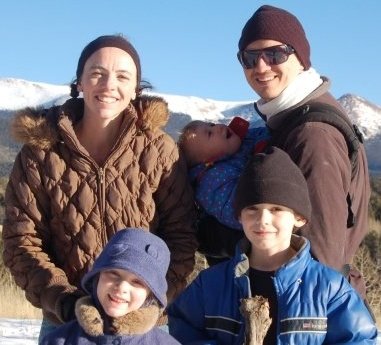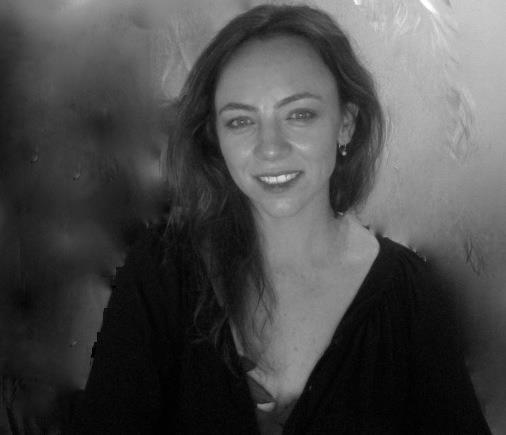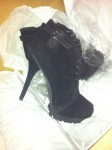Teaching and Learning and Caring Blog
I remember the first time we spoke, more than ten years ago now: my Medical Sociology class in the Psychology building. You were assertive, unlike most UTEP students, and wanted to know what kind of bias inherent in the textbook I had chosen for the class. I believe I told you to read it and then tell me. That slightly awkward beginning grew into mutual respect and affection as we shared ideas and a love of New Mexico, even and perhaps especially, after the class was over. I watched you from afar, as you transformed from undergraduate to wife, mother, and graduate student. You must have kept that textbook since you recently told me you show your own students the picture of the woman in Islamabad breastfeeding a healthy son and bottle feeding his emaciated twin sister.

Annie and her lovely family. (Photo courtesy of Annie Feighery)
You are again at a crossroads. They occur with some regularity in our lives. Columbia University will confer the Doctoral Degree in Health and Behavior after giving you two masters (Public Administration and International Educational Development). Your three children thrive, you still adore your husband, and you wonder how you will fit into academia or even whether you will. Well, I have a bit of advice for you. Your life is wonderful now; don’t ruin it!

Annie atop Mt. Wheeler, the highest peak in New Mexico. On her back, her youngest daughter, covered in the "supermom" cape, aka a coat to keep her warm. (Photo courtesy of Annie Feighery)
Although you are equally at home in New York City or the wilds of New Mexico, you will not be comfortable in academia. It’s not that I don’t think you would be a great teacher; I do. You exude enthusiasm for knowledge, for life. It’s not that I don’t think you would be a productive scholar; I do. You have a million ideas racing around in that head of yours. It’s not that I don‘t think you could balance a career with family; I do. You have proven it over and over. You have enough energy for the foreseeable future to guarantee that even the family cat doesn’t feel neglected. Here’s why I think academia is not a good fit for you.

Annie on a family vacation in Costa Rica, hiking and taking Spanish lessons. (Photo courtesy of Annie Feighery)
You like to push the envelope, not a pile of papers. Universities are not ideal places for people who don’t fit neatly into boxes, and you are much too wiggly to stay where you are put. Even though universities are often sites of innovation and invention, the institution itself is slow to change. Universities are as likely to eat their young as nourish them and help them grow. They are places where women and other minorities learn what it is like to be a token: to be highly visible and expected to represent a whole group and simultaneously invisible as a person, to be punished for attitudes or behaviors that are rewarded in white men, to be expected to have a sense of humor and never complain. For an assertive woman who is interested in emerging technologies, and cross-disciplinary issues affecting women and children in developing countries, someone is going to have a headache. It might be you. It might be the chair of your department or your dean. It will be the kind of headache, two aspirin won’t fix.

Annie, the fashionista. (Photo courtesy of of Annie Feighery)
Plus, you are always going to be a fashionista. You want your hair just so, your high heels to match your latest outfit. Dowdy is not a word in your dictionary. Someone, and all it takes is just one someone, will hate you for it or some other silly reason, will judge you hastily or be jealous or decide to puncture your balloon just because she can. I say she because it will likely be a woman who does this. I never thought much about feminism until I got to academia, and saw the world in such an “un-female friendly” way. Meetings were set at times when every academic needs a wife… to pick up the kids from school or make dinner, and both men and women make unkind comments about female faculty members. It was in this milieu that I became what students often refer to as a “feminazi.”
When I was planning my retirement, I asked to be considered for emeritus status. Silly me, I didn’t study Latin and didn’t know many retired female professors. Women, upon whom this distinction is conferred, are emerita Who knew? Who cares? I just wanted to keep my email account so I could hear from former students like you. Facebook is better for that anyway. I get to see and post photos.
The sign on the door of the office that I was delegated to occupy for a year read “Chairman” so I removed the “n” with a letter opener and left it like that. The person who occupied the office after me had the “n” replaced instead of removing the “ma.” After he left, it took another two years of badgering to have the sign read what it should have read all along: “Chair.” So simple, so infuriating.
Annie, my advice to you is to get a MacArthur genius grant, write a lifetime proposal to the Bill and Melinda Gates Foundation or start your own non-profit. If none of that works out, there’s always academia…maybe it has changed since 2010. Plus, I’m proof you can live through it and make some good friends along the way.
- Annie atop Mt. Wheeler, the highest peak in New Mexico. On her back, her youngest daughter, covered in the “supermom” cape, aka a coat to keep her warm. (Photo courtesy of Annie Feighery)
- Annie and John, still in love, after three kids and several degrees between them. (Photo courtesy of Annie Feighery)
- Annie and her five inch hiking boots! I wonder what outfit they go with? (Photo courtesy of Annie Feighery)
- Annie and her lovely family. (Photo courtesy of Annie Feighery)
- Annie, the fashionista. (Photo courtesy of of Annie Feighery)
- Annie on a family vacation in Costa Rica, hiking and taking Spanish lessons. (Photo courtesy of Annie Feighery)








Ah, Cheryl, I don’t know Annie, but this is a wonderful post. So…it will be interesting to see which turn in the road she chooses to travel, won’t it?!?
Six months after its publishing, this article needs an update! Last week, Forbes posted a list of the most and least stressful jobs in which university professor was listed as a least–to the absolute consternation of my academia friends. It brought me back to Cheryl’s advice and experiences. The stresses she faced seemed deeply personal as opposed to a palpable daily grind. Maybe the reason Forbes’ writers did not perceive the difficulties of being a professor is that more professors do not speak out loud, like she bravely did, about the pressures they feel.
I believe academia, as Cheryl knew it, will die. The university is just beginning the cultural Web 2.0 revolution from which journalism is just emerging and, like journalists, those professors who survive will be stronger but fewer in rank. They are dinosaurs already and do not know it. I love teaching and I hope to always teach some form of students. My hope is that the learning environments of the future will be ready for people like me.
I am submitting my dissertation this month and, to my complete surprise, I have not applied for a single post-doc. My tech start-up/NGO, mWater, is taking off. We just got a USAID grant to scale up our work in Tanzania and Rwanda. I feel like I am always working 24-7 and I love it. I have meetings at the cafe outside my daughter’s ballet and I skype during half-time at my son’s soccer games. The highlight of my year was a personal email from the Minister of Health of Rwanda kindly saying she enjoyed our work together. When I last met with the Honorable Dr. Binagwaho last October, I wore the jewelry Cheryl made for me.
Cheryl, I am so grateful for your years as a professor because you more than most, put me on this path. People like you inspire me to keep passing along that inspiration and wisdom you shared all those years ago at UTEP. You haven’t stopped teaching, you just have a different kind of classroom now.
Cheryl, Annie, this is a great post. You are inspiring!